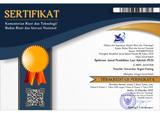Natural School Management: A New Paradigm for Education
 ), Friscilla Wulan Tersta(2), Eva Iryani(3),
), Friscilla Wulan Tersta(2), Eva Iryani(3), (1) Universitas Jambi
(2) Universitas Jambi
(3) Universitas Jambi
 Corresponding Author
Corresponding Author
DOI : https://doi.org/10.24036/spektrumpls.v9i4.114283
Full Text:
 Language : en
Language : en
Abstract
School of nature is one of the new concepts in the world of education. The natural school is basically an alternative form of education that uses the universe as a place of learning, teaching material and also as an object of learning. According to some experts, it is believed that this concept is an effective approach for the realization of activities related to active learning. The aims of this research are to investigate how the management of natural schools works, specifically in planning, organizing, actuating, and controlling. This study utilized qualitative method with a case study approach. The data were collected by semi structure interview, observation and documentation. The data were then analyzed, described, and interpreted comprehensively. The data revealed that character education and religion are emphasized to the students in teaching and learning process. There are 3 curriculum adopted in the management of this natural school, namely: Curriculum implemented by the national Education Office, IT (Islam terpadu) curriculum, and BBA curriculum (learning with nature). It was agreed to create an academic student and balanced character.
References
Adipratama, Sumarsono, dan Ulfatin (2018). Manajemen kurikulum terpadu di sekolah alam berciri khas Islam. Jurnal Administrasi dan Manajemen Pendidikan, Vol 1 (3).
Ballantyne, Roy., dan Packer, Jan. (2008). Learning for Sustainability: The Role and Impact of Outdoor and Environmental Education Centres. Australia: The University of Queensland.
Çelik S & Kasapoğlu H. (2014). Implementing the recent curricular changes to English language instruction in Turkey: opinions and concerns of elementary school administrators. South African Journal of Education, 34(2)
Connie Chairunnisa. 2016. Manajemen Pendidikan dalam Multi Perspektif. Depok: PT. Rajagrafindo Persada.
Creswell, J. (2007). Qualitative Inquiry & Research Design: Choosing Among
Five Approaches, 2nded. California : Sage Publication.
Dowdell, K., Gray, T., & Malone K. (2011). Nature and its influence on children’s outdoor play. Australian Journal of Outdoor Education, 15(2), 24-35.
Dyment, E.J., & Bell, A.C. (2008). Grounds for movement: green school grounds as sites for promoting physical activity. Health Education Research, 23(6) 952-962. doi: 10.1093/her/cym059.
Erickson, Martha Farrell. (2008). Ensuring That All Children Can Spend Quality Time Outdoors. Beyond the Journal: The Children & Nature Network.
Gautheron, O. (2014). Teachers' Perceptions of the Effects of Nature-Based Learning on Junior Level Students (Thesis). Institute for Studies in Education of the University of Toronto
Hikmat. 2014. Manajemen Pendidikan. Bandung: CV. Pustaka Setia.
Imam Machali. (2016). The Handbook of Education Management. Jakarta: Prenadamedia Group.
Husren & Islek .(2017). The effect of a school-based outdoor education program on Visual Arts teachers’ success and self-efficacy beliefs. South African Journal of Education, Vol 37 (3).
Kadir Sobur. (2015). Logika dan Penalaran dalam Perspektif Ilmu Pengetahuan. Jurnal Tajdid. Volume XIV, No.2 : 387-414.
Lloyd, Amanda., dan Gray, Tonia. (2014). Place-Based Outdoor Learning and Environmental Sustainability within Australian Primary Schools. Journal of Sustainability Education.
Maulana, H. (2016). Pelaksanaan Pendidikan Karakter di Sekolah Alam. Jurnal Khasanah Ilmu. Volume 7, No.1 : 21-31.
Miles, MB & Huberman, AM. (1994). Qualitative Data Analysis (2nd edition. Thousand Oaks, CA: Sage Publications.
Nurochim. (2016). Administrasi Pendidikan. Bekasi: Gramata Publishing. [Online]. Tersedia: http://www.susted.org/. [diakses tanggal 4 Agustus 2017].
Norvadewi. 2015. Bisnis dalam Perspektif Islam. Jurnal Ekonomi dan Bisnis Islam Al-Tijary. Volume 1, No.1 : 33-46.
Rasyad. (2015). Dimensi Akhlak dalam Filsafat Islam. Jurnal Substantia. Volume 17, No.1 : 89-102.
Rosenow, Nancy. (2008). Learning to Love the Earth and Each Other. Beyond the Journal: Teaching and Learning abaout the Natural World. [Online]. Tersedia: http://www.journal.naeyc.org/. [diakses tanggal 4 Agustus 2017]. Tatang S. 2015. Manajemen Pendidikan Berbasis Sekolah. Bandung: CV. Pustaka Setia.
Stornelli, A. (2017). Implementing a Nature-Based Approach in Elementary Schools. (Thesis). Department of Curriculum, Teaching and Learning Ontario Institute for Studies in Education of the University of Toronto.
Wilson, Carla. (2011). Effective Approaches to Connect Children with Nature. New Zealand: Department of Conservation.
 Article Metrics
Article Metrics
 Abstract Views : 317 times
Abstract Views : 317 times
 PDF Downloaded : 128 times
PDF Downloaded : 128 times
Refbacks
- There are currently no refbacks.

This work is licensed under a Creative Commons Attribution-NonCommercial 4.0 International License.



